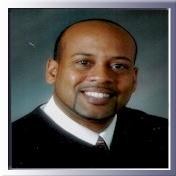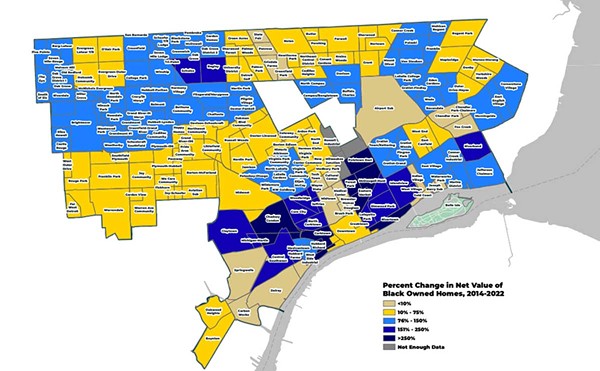You'll be heading to the polls (hopefully) to cast a vote in the local primary elections on Tuesday.
Local elections tend to not get a lot of participation, so we are nervous to even look up the stats on local primaries (okay, we just looked it up. In 2014 only 17.4 percent of Michiganders went to the polls). That said, if we've learned anything from this presidential election: 1. Voting matters 2. Local politics really matter.
With that in mind let us present you with some of the people and issues to look out for when you're in the voting booth tomorrow.
Wayne County Treasurer
There are currently two individuals running for this position. The Wayne County Treasurer runs the county's tax foreclosure auction, a contentious and controversial system. In fall 2015 Raymond Wojtowicz stepped down from the position, and Richard Hathaway — a former chief assistant prosecutor for Wayne County Prosecutor Kym Worthy — was appointed in December. He, however, stepped down in the spring. In April Eric Sabree, chief deputy treasurer, was tapped to fill the post until the election. So who is running to take over long term? Eric Sabree (who is currently at the helm) and Beverly Kindle-Walker. Let's learn a bit more about your choices.
Eric Sabree: Sabree is the interim Wayne County Treasurer.
According to Voter's Guide Michigan, he believes the two biggest areas of improvement for the Wayne County Treasure are: customer service and management performance.
He proposes fixing the former by "providing intentional and focused staff training, making decisions based on analyzed data, and increasing the efficiency of the office's phone call center" and the latter by "engaging managers in intense training aimed at increasing the efficiency of employees and processes in the office." When asked if the Wayne County Tax Foreclosure Auction — which included 8,000 occupied homes in the 2015 auction — works the way it currently runs Sabree said "yes".
"The online public property tax auction, despite the large volume of properties, works like it should," he said. "The Treasurer's office conducts its auction 'in house' after three years of contracting with outside vendors. The change to 'in house' results in a savings of approximately $700,000 per year. Conducting the 'in house' auction allows for troubleshooting of problems, immediate respond to questions, and the ability to monitor the bidding activity throughout the auction."
When asked what he would change about the auction he said, "giving all buyers 72 hours instead of 24 hours to pay for auction properties. Anyone prequalified with intentions of living in the purchased property will be given up to 45 days to pay for their purchase. Real estate brokers will be used to show a select number of quality properties for which a title insurance policy will be provided. Prior to the auction, internet instructional sessions will be available for clarification of auction procedures."
Beverly Kindle-Walker: With 25-years of experience in administration, legislation and management, Kindle-Walker has been running for this position for a couple years now (at one point she had a Freep endorsement). In Kindle-Walker's opinion land management and the restoration of public trust are two of the biggest issues the Treasurer's office needs to address (she believes an outside audit of the Delinquent Tax Revolving Fund is overdue). While Sabree says "yes" the system works as is, Kindle-Walker is less convinced.
"No," she says. "Currently the FBI is investigating the Wayne County Treasurer auctions from 2009 – 2014 according to an extensive front-page report in Crain’s Detroit, February 27, 2016 issue. It involves flipping of properties, foreign funds, unregistered agents and wire transfers. I would be on special guard for speculators or dummy corporations who flip properties and don’t pay taxes or utilities such as water bills."
In terms of what she would change Kindle-Walker says she'd "re-examine the current on-line auction process" and also the fees associated with bidding.
Synthesis: Kindle-Walker represents a more innovative approach to the Wayne County Tax Auction. Sabree, while open to reform, is more in line with the current process.
Wayne County 3rd Circuit Court Judge
There are currently four positions open at the Wayne County Third Judicial Circuit Court (located in the Coleman A. Young Municipal building), and 21 candidates running for these limited spots. The eight individuals to get the most votes Tuesday, will then be featured on the November 8th ballot. The 3rd Circuit Court handles civil cases dealing with funds over $25,000, criminal cases, and familial cases such as those having to do with divorce, paternity disputes, and adoptions. According to the Detroit Free Press, at least three of the newly elected judges will likely ended up in the court's criminal division (the state's busiest) because incumbent judges will claim preferred assignment first. Each term is six-years.
Let's learn a bit more about the 21 candidates.
E. Lynise Bryant Weekes: Weekes is already a judge, in 2007 Gov. Jennifer Granholm appointed her to the 36th District Court, where she presides over the traffic/criminal docket. Weekes currently has "No Rating" by the Detroit Metropolitan Bar Association, which means she did not submit a questionnaire or attend an interview and there was insufficient information to assess her as a candidate.
Delicia Coleman: Coleman currently specializes in criminal defense, and also real estate, family and civil representation. Previously she was the Assistant City Attorney for the City of Ecorse, and has experience as a prosecutor. As a bit of extra information, she has been a resident of Detroit for 20-years and currently sits on the board of BLAC magazine. According to Coleman's campaign website her main issues are, "Being Tough on Crime and Strong on Education to give alternatives to the youth." When asked in a "Voter's Guide" questionnaire what factors she'd consider when handing down a sentence in a criminal case she said, "Seriousness of the Offense, Sentencing Guidelines, Victims input, and Defendants acknowledgement of responsibility." Coleman currently has "No Rating" by the Detroit Metropolitan Bar Association, which means she did not submit a questionnaire or attend an interview and there was insufficient information to assess her as a candidate.
Rebekah Coleman: Coleman has a private practice in downtown Detroit, where she specializes in Chapter 7 bankruptcies. A native Detroiter she went to Cass Technical High School, then Michigan State (where she studied theater), and finally got her JD from Wayne State University. Coleman currently has "No Rating" by the Detroit Metropolitan Bar Association, which means she did not submit a questionnaire or attend an interview and there was insufficient information to assess her as a candidate.
Felicia Courtright: Courtright has been practicing law for 21-years, in that time she has been a private defense attorney, as well as a prosecutor working on criminal cases. Courtright currently has a "Well-Qualified" rating by the Detroit Metropolitan Bar Association. (To be "Outstanding" — the highest rank, which is right above — one must "be a person whose preeminence in the law and as a citizen is widely acknowledged and whose qualifications are virtually hailed by judges and lawyers.).
Melissa Cox: Cox, who is 33, has worked for the past decade as an attorney for the Northville, Michigan firm Fausone Bohn, LLP. According to her "Voter's Guide" questionnaire she litigates "cases in the Wayne County Circuit Court with a high-volume caseload of complex domestic relations matters and a focus on adoptions and multi-jurisdictional custody matters." She also serves as an assistant city attorney for the communities of Westland and Wayne, where she serves a prosecutor in cases that deal with criminal misdemeanors as as well as class action lawsuits (she says 70 percent of her time as an attorney is on civil matters). Her judicial philosophy, according to her website, is "the judicial role is limited to the interpretation and application of the written law." (aka she is a follow the law to the letter kind of woman). Cox is endorsed by numerous organizations including Right to Life of Michigan. When asked in a "Voter's Guide" questionnaire what factors she'd consider when handing down a sentence in a criminal case she said, "impact or injury on any victim(s), whether the crime involved violence, whether the offender is a first time offender or repeat offender, criminal history whether offender was main offender or accessory, whether the crime was committed under great personal stress, whether the offender is genuinely remorseful, whether the crime was related to or committed due to addiction, what rehabilitative resources are available to and would benefit the offender." Cox currently has a "Qualified" rating by the Detroit Metropolitan Bar Association, which means she was deemed "average" when considering "legal ability (scholarship, analysis, judgment, clarity of expression), trial experience, integrity, honesty, judicial temperament, and reputation, without regard to party affiliation, race or creed."
Matthew Evans: Evans, who grew up downriver and whose parents were Detroit school teachers, has been practicing as a sole practitioner for the the past 20-years, with a focus on Indigent Criminal Defense. According to his campaign website he has "been a member of a state bar task force on indigent defense and was the principle drafter of the state bar's position on standards of practice for the representation of the poor." He also is a board member of the Criminal Advocacy Program of the Third Circuit Court. When asked in a "Voter's Guide" questionnaire what factors he'd consider when handing down a sentence in a criminal case he said he'd "first begin with an accurate scoring of the sentencing guidelines, ensuring that all factors are properly scored. Then I would carefully read the victim impact statement and the defendant's own sentencing statement. I would look for factors that are not covered in the sentencing guidelines such as admission of guilt, financial impact on the victims and other mitigating factors. Then I would assess the likelihood of rehabilitation and then craft a sentence which would be appropriate. I believe that most people can be rehabilitated and become a productive member of society." The Detroit Metropolitan Bar Association ranked him as "Well-Qualified" and he was also endorsed by the Detroit Free Press — he has more or less be characterized as a "safe-bet."
Wanda Evans: Evans is currently a Judge of the 36th District Court. She was elected in 2012 and her term is supposed to end in 2019. Prior to becoming a judge she was trial attorney, she also served as probation officer for Wayne County and a therapist. In 2013 Evans was sued by Jean West a local "church lady" who is known for helping candidates campaign amongst elderly and religious folks. According to the suit, in 2012 — when campaigning for her current position with the 36th District Court — Evans made a verbal agreement with West; she would pay her in exchange for help setting up speaking engagements at local churches. West, however, said, when suing Evans in small claims court, that the judge never paid her the agreed upon amount of $3,500. Evans currently has "No Rating" by the Detroit Metropolitan Bar Association, which means she did not submit a questionnaire or attend an interview and there was insufficient information to assess her as a candidate.
Robert Ficano: Nope, not going to bother with this one. Just remember: NO. (Detroit Metropolitan Bar Association deemed Ficano "Unqualified" — he is the only candidate they noted as such).
Tracy Green: Green, a graduate of Cass Technical High School and Wayne State University, is the legal director of the Detroit Center for Family Advocacy (CFA), a University of Michigan Law School legal services program. She has been practicing law for nearly 20-years and in that time she has focused primarily on areas of child welfare, family, and criminal law. When asked in a "Voter's Guide" questionnaire what factors she'd consider when handing down a sentence in a criminal case she said, "I would consider whether violence was involved, the vulnerability of the victim, as well as the age, background, and criminal record of the defendant." Green currently has a "Qualified" rating by the Detroit Metropolitan Bar Association, which means she was deemed "average" when considering "legal ability (scholarship, analysis, judgment, clarity of expression), trial experience, integrity, honesty, judicial temperament, and reputation, without regard to party affiliation, race or creed."
Thomas Hathaway: Hathaway is currently an attorney at Clark Hill. While his campaign website is currently down, the Clark Hill site says he is a part of the firm's "Labor & Employment Practice Group where he advises and litigates on all aspects of public and private sector management and executives in labor and business litigation, including employment discrimination, wrongful discharge, harassment, retaliation, whistleblower, trade secret and non-compete matters and counseling on business and personnel matters." According to the "Voter's Guide" questionnaire that he filled out, since 1988 his practice "except for pro bono" work has been civil cases. Hathaway is endorsed by a number of organizations including the Police Officers Association of Michigan and Right to Life Michigan. When asked what factors he would consider when handing down a sentence in a criminal case he said, "The pre-sentence report gives advisory guidelines for sentencing a convicted criminal, including work and prior criminal records. In addition the victim can also submit a statement, which would always be considered, along with any relevant extenuating or exacerbating circumstances." Hathaway currently has "No Rating" by the Detroit Metropolitan Bar Association, which means he did not submit a questionnaire or attend an interview and there was insufficient information to assess him as a candidate.
James Humphries: Humphries is a private practitioner, who has been practicing law for 30-years. He is a born-and-raised Detroiter who stresses the local angle — he went to Detroit schools and University of Michigan, where he played football. His experience includes: family law, contract law, defense and prosecution. He is interested in having technology in the courtroom. Humphries currently has "No Rating" by the Detroit Metropolitan Bar Association, which means he did not submit a questionnaire or attend an interview and there was insufficient information to assess him as a candidate.
Kenneth J. King: Judge Kenneth J. King has served the 36th District Court since 2006 — he was appointed by former Gov. Jennifer Granholm. He served as the district court's chief judge from January 2012 until July 2013 when he was removed by the Michigan Supreme Court following a report that found, according to NBC, "36th District Court was plagued by financial mismanagement, a backlogged docket and a bloated payroll." In November 2014 he was, however, re-elected unopposed for another six-year term (the one he is currently serving, and that is supposed to go until 2020). He is a graduate of Michigan State University and the University of Detroit Mercy School of Law. He has been endorsed by the Detroit Free Press, however, he currently has "No Rating" by the Detroit Metropolitan Bar Association, which means he did not submit a questionnaire or attend an interview and there was insufficient information to assess him as a candidate.
Michelle Letourneau-McAvoy: A licensed attorney for the past 17-years, Letourneau-McAvoy started her career as a legal aid lawyer "fighting for the underdog," as her campaign website puts it. She currently runs her own law firm, which employees three other attorneys and three support staffers. The Detroit Metropolitan Bar Association ranked her as "Well-Qualified." Karyn Macdonald: MacDonald has nearly 20-years experience as an attorney. She was born and educated in Detroit, attending Wayne State University for undergrad and Detroit College of Law for her JD. MacDonald's mother Kathleen is a distinguished attorney and current third circuit judge — the Free Press warned that this may give her name recognition but warned voters that she may not be experienced enough. In 2007 the State of Michigan Attorney Discipline Board placed her on probation for two-years after she pled no contest to allegations that in regards to five clients she "failed to act with reasonable diligence and promptness." MacDonald currently has a "Qualified" rating by the Detroit Metropolitan Bar Association, which means she was deemed "average" when considering "legal ability (scholarship, analysis, judgment, clarity of expression), trial experience, integrity, honesty, judicial temperament, and reputation, without regard to party affiliation, race or creed."
Brian L. Morrow: Morrow currently works for the Wayne County Prosecutor's Office where he is the Deputy Chief of the Juvenile Division. There he developed the office's Teen Court program, a juvenile diversion program that is currently operating in six facilities with in the county. An attorney for 25-years Morrow attended Wayne State University for undergrad and University of Michigan-Ann Arbor for his law degree. Prior to joining the Prosecutor's Office Morrow was a sole practitioner for about five-years. During that time he handled criminal and delinquency cases. Before this he focused on environmental law. When asked by the "Voter's Guide" what he'd consider when handing down a sentence in a criminal case he said, "In accordance with the Michigan Supreme Court's decision in People v Lockridge, I would first consult the applicable guidelines range and take those guidelines into account when imposing a sentence. That being said, my experience as a prosecutor and as a defense attorney has taught me that each criminal case is different, and that each defendant should be viewed individually given the facts of the case and his/her role in committing the offense. I would consider factors such as: what role the defendant played in perpetrating the crime; whether anyone was hurt; and whether the defendant was particularly cruel to a victim; as well as how the crime had impacted the victim's life and well-being." Morrow was endorsed by the Detroit Free Press and received a "Well-Qualified" ranking from the Detroit Metropolitan Bar Association.
Kelly Ann Ramsey: Ramsey has been a referee of the Michigan 3rd Circuit Court's Family Division - Juvenile Section for over 20-years. She also served five-years as an Assistant Wayne County Prosecutor with the Child Abuse Unit. She received her JD from Wayne State University in 1986. Ramsey is an advocate for children and her campaign website says she "works for protection, safety and well being of the people of Wayne County." She received a "Well-Qualified" ranking from the Detroit Metropolitan Bar Association.
Isaac Robinson: Robinson is currently a legislative Aide to Detroit City Councilman Gabe Leland. According to his "Voter's Guide" questionnaire he is a general practitioner with experience in labor law, contract law, personal injury, probate, property law and criminal law. Previously he worked for the Michigan Teamsters Union in Detroit, Teamsters Local 743 in Chicago, IL, and Congressman John Conyers. He says 80 percent of his work deals with civil law. Part of his pro-bono work centers around foreclosure prevention work. When asked what he would consider when handing down a sentence in a criminal case, Robinson said, "I would consider the nature of the offense, the history and background of the offender, and the surrounding circumstances of the case. I would balance the danger posed to the community by the offender and her/his potential for rehabilitation." He currently has "No Rating" by the Detroit Metropolitan Bar Association, which means he did not submit a questionnaire or attend an interview and there was insufficient information to assess him as a candidate.
Suzette Samuels: Samuels is currently a lead attorney in the Wayne County Prosecutor's Office, she has been with the office for 15-years. During this time she also helped in forming the Prosecutor's first sexual assault unit — she was a lead attorney and supervisor of this unit for 6-years. Prior to joining the Wayne County Prosecutor's Office, Samuels was an Assistant City Attorney for the City of Dearborn. When asked what factors she would consider when deciding the sentencing in a criminal case she said, "The nature and facts of the case; the harm done to the victim and the victim(s) position regarding sentencing; Public and community safety; the defendant's relationship, if any, with the victim; the age of the defendant, and the defendant's background; the defendant's support system, if any; factors weighing for and against defendant's rehabilitation; statutory sentencing guidelines (which have recently become advisory for judges, rather than mandates); Mental and physical health reports; reports from case workers, probation officers, etc.; a judge must consider any and all relevant information before passing sentence." Samuel was ranked as "Well-Qualified" by the Detroit Metropolitan Bar Association.
Regina Thomas: A graduate of Cass Technical High School, Thomas attended Tennessee State University for undergrad and then Vanderbilt University School of Law. She currently has 19-years of experience as an attorney. In 2010 Thomas joined the Wayne County Prosecutor’s Office as an assistant prosecuting attorney assigned to the Special Operations Unit; she worked on adult and juvenile matters. She is currently deputy chief counsel at the Legal Aid and Defender Association, where she is providing general civil legal assistance to low income people. When asked what she would consider when deciding the sentencing in a criminal case she said, "I would consider several factors when determining sentencing. I would look at the crime committed and the circumstances surrounding the act, the relationship between the victim and the defendant, if any, as well as the background of the defendant as provided in the pre sentence report and any sentencing memorandum provided to the court by counsel. I would bear in mind the need for closure for the victim as well as public safety always seeking to be fair and impartial." She currently has "No Rating" by the Detroit Metropolitan Bar Association, which means she did not submit a questionnaire or attend an interview and there was insufficient information to assess her as a candidate.
Michael Woodyard: Woodyard is currently working as an Assistant Wayne County Prosecuting Attorney; he has worked for the county prosecutor's office his entire 13-year law career (previously he worked as a reporter). "I have spent my every working day appearing in the very court I now seek to serve as a judge," he said in his "Voter's Guide" questionnaire. "I have served primarily in the Child Abuse Unit, seeking justice for children who were injured by those they trusted, and in the Public Integrity Unit, investigating, prosecuting and convicting police officers for unlawful use of force and other breaches of the public trust." When asked what he'd consider when deciding the sentencing in a criminal case he said, "A judge is to consider the values of punishment to the offender, deterrence to society, and the possibility of rehabilitation. But a judge must do much more than just a recite these factors. Indeed, as judge, I believe it is essential to consider the manner in which the crime has affected the victim, to consider the background of the defendant that brought them to the point that they committed the crime, and to consider the safety of society and our interest in maintaining all of our citizens as contributing members. Having taken part in hundreds of sentencing hearings myself, I know that sentencing is perhaps the most difficult and nuanced aspect of the Circuit Court Judge's duties." Woodyard is considered "Well-Qualified" by the Detroit Metropolitan Bar Association.
36th District Court Judge
There are currently two non-incumbent judge positions for within the 36th District Court, and six individuals running for the six-year term job. If you're an average citizen in the city — perhaps a traffic ticket here or there — the 36th District Judge is the one you'd most likely come into contact with. It's where you go for small claims court, civil cases up to $25,000, landlord-tenant issues, marriage ceremonies, misdemeanor cases, probation and, oh yeah, traffic violations.
Let's dig into the candidates.
Christopher M. Blount: This is not Blount's first rodeo. He ran for 36th Judicial District Court in 2012. The Wayne State University graduate's professional experience includes time working as a deputy defender in the State Defender Office. He currently has "No Rating" from the Detroit Metropolitan Bar Association.
Richard J. Bowers, Jr.: Bowers, who holds not only a Michigan Law License but a Tennessee license, has worked for Detroit City Council as well as four mayoral administrations. He says he also has experience with "asbestos litigation, general defense, real estate, contracts, and some criminal" law from work as a private practitioner. He is considered "Qualified" by the Detroit Metropolitan Bar Association.
Kahlila Yvette Davis: An alum of Cass Technical High School, University of Michigan-Ann Arbor and Wayne State University, Davis currently works as a criminal defense attorney and solo practitioner. According to her, 80 percent of her practice deals with criminal law: felony matters as well as traffic/misdemeanor matters. As she puts it, "Throughout my legal career, I have always been a True Solo with a practice that primarily consists of representing indigent defendants in criminal matters." She is considered "Well-Qualified" by the Detroit Metropolitan Bar Association.
Kenyetta Stanford Jones: A graduate of the University of Minnesota and Thomas Cooley Law School, Stanford Jones began interning for the Wayne County Prosecutor’s Office in 2003. The following year she accepted an appointment by Wayne County Prosecutor Kym Worthy. During her twelve-year tenure she says she has litigated, "hundreds of felony offenses ranging from murder, assault with intent to murder, robbery, and criminal sexual conduct." She has the endorsement of Mayor Mike Duggan, Worthy, and Wayne County Executive Warren Evans. She currently has "No Rating" from the Detroit Metropolitan Bar Association.
Kristine Longstreet: According to Longstreet's Campaign Facebook page she "spent my entire legal career fighting for the rights of the underprivileged & disenfranchised as a Deputy Defender at Legal Aid." She currently has "No Rating" from the Detroit Metropolitan Bar Association.
Millicent Sherman: Sherman has served the 36th District Court as a magistrate since 2006. She is a graduate of the University of Michigan School of Law. The Detroit Metropolitan Bar Association has deemed her "Qualified." As a total aside, Google indicates she may be into Cosplay? Which is pretty cool, if true.





































